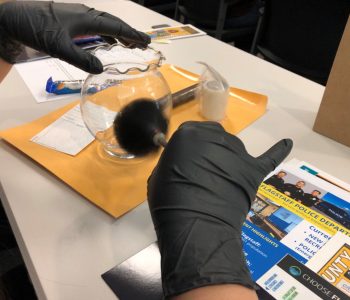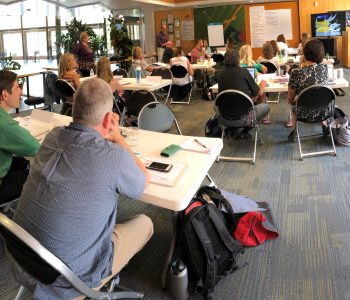 Early Learning CAN
Early Learning CAN
KDI Implementation Update
KDI Team Making Progress
FLAGSTAFF (August 8, 2018)
The multi-LEA (local education agency) that formed to pilot implementation of the Kindergarten Developmental Inventory (KDI) has made steady progress since being granted approval from the Arizona Department of Education (ADE) to begin their work.
The team of local early childhood educators and administrators received training through out the spring of 2018 in use of the KDI from Teaching Strategies, the company contracted by the ADE for implementing the KDI. Linda Harbottle, Literacy Coach with Flagstaff Unified School District and team lead for the implementation said that they have received good support from Teaching Strategies during this phase.
Full implementation of the KDI pilot will happen with the start of classes this month in PEAK Charter School and four FUSD elementary schools (Killip, Kinsey, Marshall and Sechrist). Kinsey Inquiry and Discovery School was added to the implementation cohort after news of the collaboration sparked additional interest from other teachers in the community.
Mountain Elementary School was part of the original team, however with unforeseen staffing changes made over the summer, Mountain School has chosen to temporally withdraw from the pilot, according to board member Renee Fauset. Despite this change, over 200 kindergarten students will be participating in this initial implementation phase with the addition of Kinsey.
The kindergarten teachers in the participating FUSD schools will be allowed to forego using the district created student assessment and use the KDI for measuring student progress during the implementation. This is the fundamental role of the KDI in addition to informing teachers with individualized instruction plans in real time.
Charter elementary schools use the DIBELS assessment and according to Mountain Elementary School Director Renee Fauset, her teachers will need to use both during the implementation. She is seeking clarification from the ADE about this and hopes to only have to use the KDI as well.
At the August 7, 2018 Early Learning CAN meeting, network members had the following questions to which Harbottle answered:
CAN: Can you send us a copy of the transfer form for SAIS students that have been in PreK and need to be transferred to a Kinder class?
LH: If the student shows already existing, have the teachers fill out the attached and send back to me. I am doing transfers from pre-k to kinder (Elizabeth only has access to pre-k).
CAN: Have the checkpoint dates been set by the state yet?
LH: Checkpoints for K-3 are set by you all, as we are hoping to learn from K-3 what works best (i.e. following pre-k checkpoints or following your grading periods)
CAN: How much data per objective per checkpoint needs to be recorded?
LH: Neither Teaching Strategies nor ADE recommends a specific number of data per checkpoint, but leave that to the teachers to decide. When a number is associated this way it turns more into a compliance rather than a natural observing or recording when opportunities arise. The way I have heard this explained by TS is an analogy of a gas tank/car…. If you want it to go further, you have to add more gas…. If you want the Formative Assessment tool to tell you more about the student, you have to add more evidence/data. I know that’s silly, but it’s been the best analogy I’ve heard.
CAN: Can we have a link to the document that shows the crosswalk between TSG and the state standards?
LH: The crosswalk can be found on Teaching Strategies main page (easiest way is to search “Arizona” in their search bar). The direct link is: https://teachingstrategies.com/wp-content/uploads/2017/08/AZ-K-3-to-GOLD_3.29.17.pdf
There will be several administrators, myself included, who will be going to a 2 day training just for administrators to learn the TSG system in order to better help our teachers in implementation.
CAN: Does the KDI replace the need to do DIBELS/AIMSweb?
LH: KDI doesn’t necessarily replace DIBELS or AIMSWeb, but rather, you can use those screening tools/ benchmarks as a piece of data/evidence in GOLD/KDI. The KDI/GOLD tool is meant to complete a comprehensive assessment system. Where as DIBELS will look to measure 1-3 specific literacy skills, when combined with GOLD and all the other observations this tool provides, the teacher can get a better understanding of why the student is struggling with that one skill. Since it’s about supporting and building a comprehensive assessment system, and because we still maintain that local control component, we are not recommending one tool replace the other, but more so that each school can decide how they integrate with each other (together, replace, etc.). Especially during this partnership-first year of implementation, we again will look to you all and your team to tell us how it worked well or didn’t with what is already existing.
The first “checkpoint” for review of the program implementation will come at the end of October.
After that, the LAUNCH Flagstaff Early Learning CAN will be interested in the correlation of data between the KDI and the FUSD assessment and DIBELS. Additional questions for the CAN will be how Flagstaff can better link student information between preschools using Teaching Strategies GOLD and the schools using the KDI. This could be a big leap forward in smoothing the transition for children entering kindergarten in the future.
Updated August 14, 2018 with the Q&A responses from Linda Harbottle.
Updated September 3, 2018 with additional information about Mountain School.








